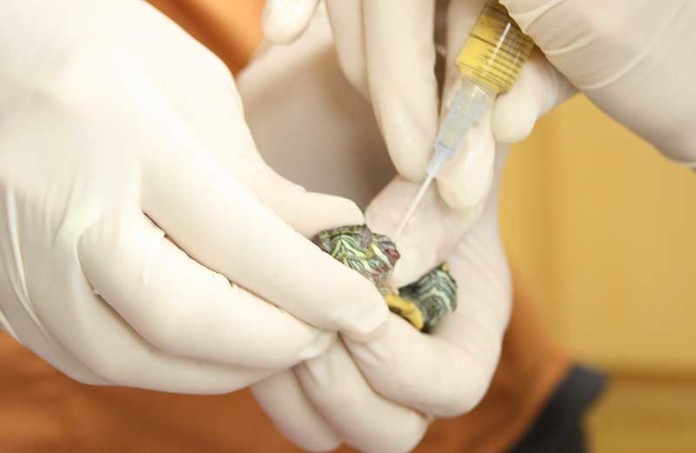Red eared sliders are popular in part because of their hardiness, but inevitably there will come a time (especially if you have a slider throughout its very long lifespan) that you will need to medicate your turtle for illness. There are some tried-and-true home remedies that you can use in a pinch, but unless you are very experienced with medicating animals you should always leave injections and the like to professional veterinarians and vet techs.
When it comes to red eared sliders and their health problems, it is usually good to have a little first aid kit on hand to deal with such things. One thing that it indispensable in your red eared slider first aid kit is povidone-iodine, a mild antiseptic that is good for using topically on your turtle. Povidone-iodine, commonly just referred to as iodine, can be found in any pharmacy and is great for treating skin lesions (to ward off infection), fungal infections, and shell rot. Another good thing to have in your turtle first aid kit is bath salts and hydrogen peroxide. Both salts are good for treating fungal infections via a saltwater bath and peroxide is great for shell rot treatment. A sulfa dip, available at many pet stores that sell reptile goods, is also good to have on hand. Sulfa dip consists of sodium chloride, sulfisoxazole and neomycin sulfate and is good for treating bacterial infections and warding off fungal infections.
If your slider has come down with something and you’ve tried the appropriate treatment for days with no results, it’s time to visit the vet. Antibiotic injections can often work wonders and the only place to get them is from the vet. Make sure you find a good herp vet online or get a recommendation from a normal vet. A good herp vet can do a thorough examination and talk to you to find out other symptoms to come up with a diagnosis and get you the meds you need. If you have a very young turtle, however, most herp vets will not administer injections as they often do more harm than good.
As you can see, many red eared slider medications consist of things you can find at the pharmacy or pet store. When it comes to non-topical things like injections, however, you need to take your turtle to the vet. Only a veterinarian or another properly trained individual can administer those types of medications.











